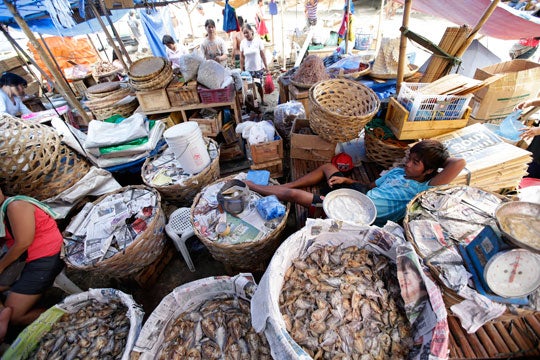
In my 10 years of working in the World Bank, I have seen remarkable changes around me. In 2004, Emerald Avenue in Ortigas Center, where the old World Bank office was located, started to wind down after 9 PM. Finding a place to buy a midnight snack whenever I did overtime was hard. It was also hard to find a taxi after work.
Today, even at 3 AM, the street is bustling with 24-hour restaurants, coffee shops, and convenience stores, hundreds of BPO (Business Process Outsourcing) employees taking their break, and a line of taxis waiting to bring these new middle class earners home. Living in Ortigas Center today means that I also benefit from these changes.
Bonifacio Global City, where the new World Bank office is located, started from empty lots and grassland a decade ago. Today, it is the fastest growing district in Metro Manila. Even at 3 AM, the district is also still very much alive. These spectacular changes are the result of high and sustained economic growth.
Indeed the last 10 years have been remarkable for the Philippine economy. The economy grew faster than any period in the last 7 decades. Today, on average, if GDP were to be divided equally among 100 million Filipinos, we would be more than twice as rich compared to 7 years ago. If current growth rates are sustained, per capita income would increase by twice in a decade, over 5 times in 2 decades, and 12 times in 3 decades. The economy is also awash with USD 40 billion every year from remittances and revenues earned by the BPO industry. Inflation has been low and stable, allowing businesses and households to raise their real income. Finally, government finances are improving. Lower deficits and debt has made it possible for the government to double social services spending in the last 4 years, with strong impact on poverty.
While millions of Filipinos are now benefiting from higher economic growth and stability, 25 million Filipinos are still living in poverty. A Filipino is poor if he lives on less than PHP 52 per day, the daily poverty line. Moreover, three-fourths of Filipino workers are informally employed with little protection when they get sick and face bleak career prospects. Also, around 3 in 10 Filipino workers are without jobs or want to work more hours since they do not earn enough.
The government has done a good job in raising growth and securing macroeconomic stability in the last decade, leading to significant job creation and poverty reduction. But much more can be done. How do we ensure that all Filipinos, especially the poor, benefit from higher growth?
For a poor Filipino to benefit from higher growth, she needs to be healthy first, so that she can spend more time in school and raise her chances of getting a good job. A poor Filipino farmer needs reliable roads, bridges, and irrigation to produce better crops and connect to markets in the cities. These are essential for raising his income and bringing him out of poverty.
These underscore the urgent need to invest more in infrastructure, health, and education. This requires new sources of tax revenues. This is not easy given the country’s long history of under-investment and weak tax collection. But the Aquino Administration has signaled a change from the past. We have a reason to believe that things can be much better for everyone.
Currently, our tax system is complex, inefficient, and highly inequitable. Many large corporations benefit from tax incentives, such as income tax holidays or reduced tax rates, when they don’t really need it (my friend working in a large corporation that receives tax incentives gets an 18th month pay), while the majority of small and micro enterprises, where the poor are, have to pay much higher taxes relative to their income. Taxes that are not adjusted for inflation also worsen the equity of the tax system, as the rich pays less and less as their income rises. The complexity of the tax system, where small and micro enterprises have to file and pay a multitude of taxes almost every month means that they spend a considerable amount of time and money falling in line and complying with tax rules, instead of doing more productive things and earning more.
These need to change. The tax system needs to be reformed so that it promotes, rather than hinders, job creation. It needs to be reformed so that Filipinos have an easier time paying taxes. It needs to be reformed so that poor people pay much less and rich people pay much more.
This is hard for many well-to-do Filipinos, but mobilizing revenues from those who can afford to pay is needed if we are to care more for the poor, by ensuring that they stay healthy, get a good education, and are able to raise their incomes. When their lives improve,, wouldn’t this be much better for the economy and for us as well?
Of course any taxpayer would want to make sure that her tax contribution from her hard-earned money is not wasted. Thus reforms to improve transparency and accountability of government spending are necessary before we can expect richer Filipinos to contribute more.
What do you think? I’d like to hear your thoughts. Helping the poor is a daunting task, but perhaps we can agree to start somewhere.


Join the Conversation